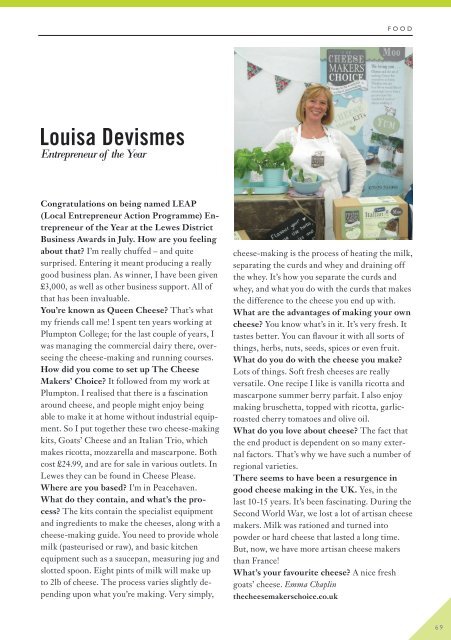You also want an ePaper? Increase the reach of your titles
YUMPU automatically turns print PDFs into web optimized ePapers that Google loves.
food<br />
Louisa Devismes<br />
Entrepreneur of the Year<br />
Congratulations on being named LEAP<br />
(Local Entrepreneur Action Programme) Entrepreneur<br />
of the Year at the <strong>Lewes</strong> District<br />
Business Awards in July. How are you feeling<br />
about that? I’m really chuffed – and quite<br />
surprised. Entering it meant producing a really<br />
good business plan. As winner, I have been given<br />
£3,000, as well as other business support. All of<br />
that has been invaluable.<br />
You’re known as Queen Cheese? That’s what<br />
my friends call me! I spent ten years working at<br />
Plumpton College; for the last couple of years, I<br />
was managing the commercial dairy there, overseeing<br />
the cheese-making and running courses.<br />
How did you come to set up The Cheese<br />
Makers’ Choice? It followed from my work at<br />
Plumpton. I realised that there is a fascination<br />
around cheese, and people might enjoy being<br />
able to make it at home without industrial equipment.<br />
So I put together these two cheese-making<br />
kits, Goats’ Cheese and an Italian Trio, which<br />
makes ricotta, mozzarella and mascarpone. Both<br />
cost £24.99, and are for sale in various outlets. In<br />
<strong>Lewes</strong> they can be found in Cheese Please.<br />
Where are you based? I’m in Peacehaven.<br />
What do they contain, and what’s the process?<br />
The kits contain the specialist equipment<br />
and ingredients to make the cheeses, along with a<br />
cheese-making guide. You need to provide whole<br />
milk (pasteurised or raw), and basic kitchen<br />
equipment such as a saucepan, measuring jug and<br />
slotted spoon. Eight pints of milk will make up<br />
to 2lb of cheese. The process varies slightly depending<br />
upon what you’re making. Very simply,<br />
cheese-making is the process of heating the milk,<br />
separating the curds and whey and draining off<br />
the whey. It’s how you separate the curds and<br />
whey, and what you do with the curds that makes<br />
the difference to the cheese you end up with.<br />
What are the advantages of making your own<br />
cheese? You know what’s in it. It’s very fresh. It<br />
tastes better. You can flavour it with all sorts of<br />
things, herbs, nuts, seeds, spices or even fruit.<br />
What do you do with the cheese you make?<br />
Lots of things. Soft fresh cheeses are really<br />
versatile. One recipe I like is vanilla ricotta and<br />
mascarpone summer berry parfait. I also enjoy<br />
making bruschetta, topped with ricotta, garlicroasted<br />
cherry tomatoes and olive oil.<br />
What do you love about cheese? The fact that<br />
the end product is dependent on so many external<br />
factors. That’s why we have such a number of<br />
regional varieties.<br />
There seems to have been a resurgence in<br />
good cheese making in the UK. Yes, in the<br />
last 10-15 years. It’s been fascinating. During the<br />
Second World War, we lost a lot of artisan cheese<br />
makers. Milk was rationed and turned into<br />
powder or hard cheese that lasted a long time.<br />
But, now, we have more artisan cheese makers<br />
than France!<br />
What’s your favourite cheese? A nice fresh<br />
goats’ cheese. Emma Chaplin<br />
thecheesemakerschoice.co.uk<br />
69


















